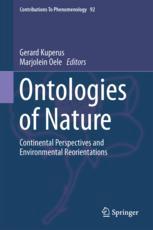

Most ebook files are in PDF format, so you can easily read them using various software such as Foxit Reader or directly on the Google Chrome browser.
Some ebook files are released by publishers in other formats such as .awz, .mobi, .epub, .fb2, etc. You may need to install specific software to read these formats on mobile/PC, such as Calibre.
Please read the tutorial at this link: https://ebookbell.com/faq
We offer FREE conversion to the popular formats you request; however, this may take some time. Therefore, right after payment, please email us, and we will try to provide the service as quickly as possible.
For some exceptional file formats or broken links (if any), please refrain from opening any disputes. Instead, email us first, and we will try to assist within a maximum of 6 hours.
EbookBell Team

4.8
54 reviewsThis volume contains essays that offer both historical and contemporary views of nature, as seen through a hermeneutic, deconstructive, and phenomenological lens. It reaches back to Ancient Greek conceptions of physis in Homer and Empedocles, encompasses 13th century Zen master Dōgen, and extends to include 21st Century Continental Thought. By providing ontologies of nature from the perspective of the history of philosophy and of contemporary philosophy alike, the book shows that such perspectives need to be seen in dialogue with each other in order to offer a deeper and more comprehensive philosophy of nature. The value of the historical accounts discussed lies in discerning the conceptual problems that contribute to the dominant thinking underpinning our ecological predicament, as well as in providing helpful resources for thinking innovatively through current problems, thus recasting the past to allow for a future yet to be imagined. The book also discusses contemporary continental thinkers who are more critically aware of the dominant anthropocentric and instrumental view of nature, and who provide substantial guidance for a sensible, innovative “ontology of nature” suited for an ecology of the future. Overall, the ontologies of nature discerned in this volume are not merely of theoretical interest, but strategically serve to suspend anthropocentrism and spark ethical and political reorientation in the context of our current ecological predicament.